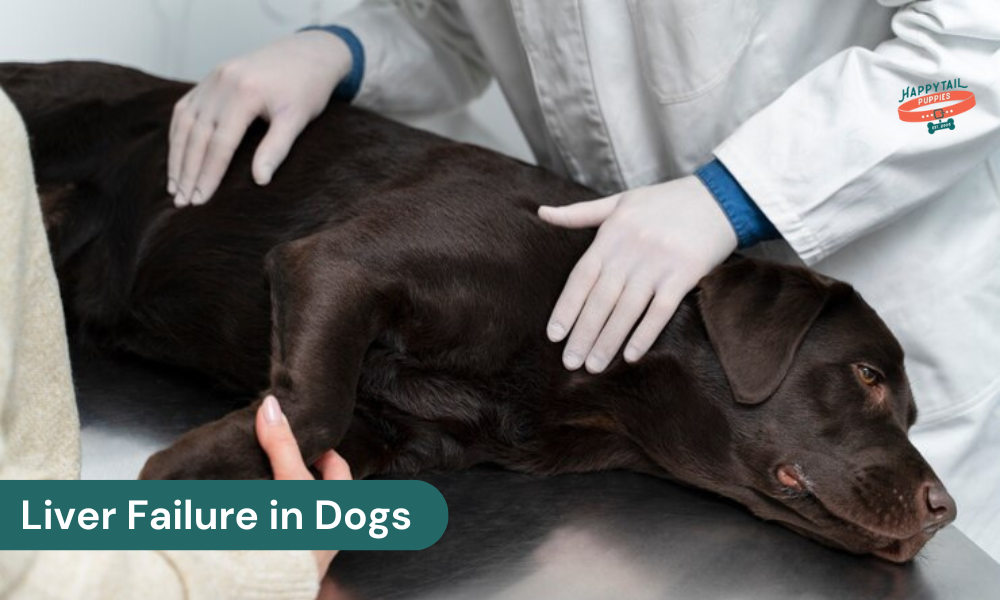Liver Failure in Dogs: Causes, Symptoms, and the Best Liver-Friendly Diet
If your dog is facing any health issues that are easily located, like a limp or a skin growth, these are often noticeable, and you can address them right away. However, with liver failure in dogs, things go unnoticed until it turns critical. This is the reason why it is important to know about the potential causes of liver failure in dogs and watch out for the right signs and symptoms. Common small dog breeds that are prone to liver failure include Yorkshire Terrier, Maltese, Shih Tzu etc. Regular vet checks remain the key to locating the liver issues early to help prolong the life of your dog. Detecting the signs of dog liver disease and adequate management can notably enhance the life quality of a dog. Identifying the causes, the symptoms, and the proper dog diet forms the essential aspect of offering them the care they often require to address Liver problems in dogs.
What is Liver Failure in Dogs?
Liver failure in dogs is often considered a clinical condition where the liver fails to perform its major roles. These include removing toxins from the blood and processing vital nutrients. The liver plays a critical role in detoxifying your dog’s body and aiding better food digestion and effective metabolic management. Dog liver disease leads to numerous issues that impact important organs and systems. The liver has a huge reserve capacity as all the cells share similar abilities. If any part of the liver stops working adequately, liver problems in dogs are common as this major organ processes and stores the toxic compounds.
Acute vs. Chronic Liver Failure
Acute liver failure in dogs is a typical condition in which the liver fails to work as it is intended to. It can arise due to the presence of toxic elements, any prevailing infection, or any serious injury. This type of liver failure is dangerous since it develops swiftly and might call for invasive treatment. Vomiting, jaundice, and a sudden lack of energy can all be common in dogs who have acute liver failure.
Chronic liver failure, in contrast, is slower and often develops over weeks, months, or years. In most cases, it is related to long-term liver disease, genetic factors, or other treatments such as medications. Because chronic liver failure takes more time to produce manifestations, it may be more difficult to diagnose at an early stage.
The Role of the Liver in Dogs
The liver in dogs is an extremely important organ, thus contributing to general health in the body since it performs some important functions. It helps in digestion by synthesizing bile, which is vital in the emulsification of fats. It also cleanses body toxins, processes nutrients in the food, stores vitamins and iron, and aids in the immune system. Also, it has an important function to perform during the process of blood clotting and in regulating blood sugar levels. Liver problems are likely some of the most dangerous ones a dog can have since the liver is so crucial to the dog’s metabolism.
Common Causes of Liver Failure in Dogs
Liver failure may be primarily due to exposure or infection—bacterial, congenital, manifesting right from birth, or viral.
Infections and Toxins
Some bacteriological and viral diseases, such as leptospirosis, are potentially fatal to dogs' livers. This type of bacterial infection might cause both acute and chronic liver failure, and the disease is likely to affect dogs who frequently interact with water. Also, the liver can be harmed by some plants that metabolize some chemicals in households and foods. Some of the things that can be toxic to the herb are xylitol which is a sweetener, engine antifreeze, and some types of medicine. Dogs can accidentally ingest these toxic elements, which are associated with either acute or chronic liver disease.
Liver Cancer and Tumors
Another cause of liver failure in dogs is liver cancer. As with all other variants of cancer, hepatocellular carcinoma exhibited in dogs can result in tumor formation and change in liver function. Some cord tumors originate in the liver; however, some can spread to other organs, which complicates their management. Although the role of early diagnosis of liver cancer for counseled therapy and possibly improving some of the conditions in affected dogs is still significant, identification of malignancy remains important.
Medication-Induced Liver Issues
A list of drugs that have been said to cause liver diseases in dogs includes those that may have been taken for a long time. The liver enzyme level improves with time when using ordinary drugs such as anti-inflammatory drugs, antibiotics, and other drugs on the market. If the dog is on long-term medication, a blood test for liver enzymes to assess liver issues will be done periodically.
Signs and Symptoms of Liver Failure in Dogs
Liver failure can manifest itself through a large number of signs, some of which can be relatively mild initially. Early signs are, therefore, very important to enable the doctor to act as early as possible.
Early Warning Signs
Some of the mild symptoms that a dog owner should look out for when diagnosing liver failure include dramatic loss of weight, excessive fatigue, and recurrent vomiting. They may also develop abnormally increased drinking or increased frequency of urination. Nausea, vomiting, and diarrhea may manifest as the liver loses its ability to neutralize body toxins or coordinate digestion. Some of these symptoms may resemble other conditions and, therefore, require pet owners' care and attention should their pet's state change.

Advanced Symptoms
Other symptoms may also manifest as liver failure progresses even further. According to the degree of jaundice, it also involves most of the visible clinical manifestations of liver diseases, such as the appearance of a yellow color on the skin, gum, and sclera. This happens when the liver cannot process bilirubin, also known as a broken red blood cell by-product. Other symptoms that may be present at this point are a swollen abdomen (ascites), confusion, seizures, and, in severe cases, coma.
Monitoring Liver Enzyme Levels
Veterinarians usually pay much attention to the blood test and check if the dogs have high liver enzymes. Liver function enzymes, which are alanine aminotransferase and alkaline phosphatase, are elevated in animals that have liver injury or stress. Regular testing, whether daily or weekly, would be suitable for dogs that had liver problems before or for those that take medications that cause damage to the liver; liver failure is treatable if diagnosed in the early stage.
Diagnosis and Treatment of Liver Failure
Like other diseases, liver failure can be diagnosed physically through examination, blood examination, and imaging studies. Your veterinarian will perform several tests to establish the level of liver damage and its cause.
Diagnostic Tests for Liver Disease
Blood tests taken in a vet’s clinic are normally used in the diagnosis of liver failure in dogs. Some of the liver disease patients will have deranged liver enzymes and low albumin levels, and the clotting profile will be deranged. Often, Ultrasound or X-ray is used for a thorough liver examination or to check whether there are any unusual shapes due to cysts or tumors. At times, the physician fails to offer a clinical screening for the condition as they are required to take liver tissue for biopsy to diagnose and determine the stage of the condition.
Treatment Options for Liver Failure
Management of liver failure in dogs involves the treatment of the underlying cause and the level or extent of organ dysfunction. In some cases, when a dog has acute liver failure, it may become necessary for the dog to be admitted into a professional animal health facility. Intravenous fluids, medications for vomiting or diarrhea, and supportive care comprise the usual management most often given. Sometimes, dogs are in need of blood transfusions if hepatotoxicity causes coagulopathies, bleeding, or otherwise.
Chronic liver failure is treated clinically by long-term treatment strategy. These may include drugs that aim at decreasing inflammation or cholestasis and drugs that facilitate the regeneration of liver cells. If liver cancer is detected, then an operation can be performed or chemotherapy done in order to remove the tumors and minimize the activity of the disease.
Liver Diet for Dogs: Best Foods for Liver Health
For dogs diagnosed with liver failure, diet can influence their overall well-being, and as such, they should be fed liver-friendly diets. The diet they take may help in offloading the liver and enhance and sustain their health at their best. Feeding the dog with foods that are less dangerous to the liver will enhance the possibility of the dog’s well-being.
What to Include in a Liver Diet
Diets prescribed for dogs with liver failure include foods with high-quality and easily digestible proteins. Chicken, turkey, and fish are lean sources of protein that possess all the essential amino acids and are not as burdensome to the liver as other meats. Complex carbohydrate foods comprise sweet potatoes, brown rice, and oatmeal; these also provide energy without overworking the liver.
Vitamins and minerals Such as biotin and cobalamin are also important in the liver and other body structures. This is taken to prevent free radicals that interfere with the organ, foods like blueberries, carrots, and several green vegetables. Fish oil contains omega-3 polyunsaturated fatty acids that have an impact that is both anti-inflammatory and regenerative on the liver and its cells.
Foods to Avoid
A few specific foods worsen liver issues and should be avoided at all costs. Processed meats, high-fat foods, and foods with higher levels of sodium exacerbate liver inflammation and stress. Furthermore, toxic foods such as onions, chocolate, grapes, and garlic damage your dog's liver more.
Supplements for Liver Health
Of course, certain supplements and products can actually be given to your dog in order to assist with liver performance and detoxification. Among these herbs, some are milk thistle due to its liver protective properties and SAM-e, which has both liver regeneration and Anti-Inflammatory properties. The second useful component pertaining to the described turmeric product is anti-oxidant which can reduce the level of Oxidative stress in the liver. Helpful within matters of inflammation and other issues and complications with the liver are omega-3 fatty acids. Do not give any supplements until consulting with a vet since some supplements do not pose any harm, and others may actually be dangerous to your dogs.
Also Read : Raw Food Diet for Dogs
Preventing Liver Failure and Maintaining Liver Health
Even though liver failure cannot be prevented in most cases, owners of dogs with liver disease should take several precautions to reduce the risk and support good liver functioning in their pets.
Routine Health Checks
Appropriate and regular vet check-ups are important to detect liver issues at their onset. Proper blood tests can monitor liver enzyme levels, and routine physical exams can aid with the identification of potential issues before they turn serious. Early detection enables a highly effective mode of treatment and a good prognosis for dogs with liver diseases.
Changes to Dog's Lifestyle
It is important to watch over the family life of your dog for the effective prevention of liver issues. Ensure that your dog is consuming a well-balanced diet and gets regular exercises that can help in the optimal functions of their liver. Furthermore, ensure restricted exposure to toxins like poisonous plants, harmful chemicals, and a few medications that reduce the risks related to liver damage. Ensure that the household cleaners, medications, and several other dangerous elements of the reach of your dogs, preventing any accidental ingestions.
Conclusion
Liver failure is a critical condition in dogs that should be handled properly and appropriately. We all know that early diagnosis is important, but understanding how you can aid the liver through diet, for example, is crucial to improving the quality of your dog’s life. Diet, medical check-ups, and vet attention can help to deal with liver disease and add more happy years to your dog’s life. If your dog shows symptoms that might indicate liver disease, then you need to visit your vet so that the dog can be specially managed.
Do you wish to explore more about the liver health of your furry companion? If you haven’t till now, then connect with the vet today to know the next plan of action and the best diet for your dog. To learn more about how to care for your dog properly, browse our blog section and go through our article on pet nutrition!


